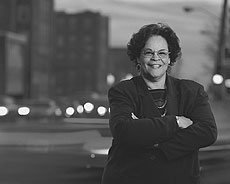
|
|
Senator
Allan Spear '58 | Janet
Denison Howell '66 | Charlene
Drew Jarvis '62
Political Science
Until 1978, Jarvis (who holds a Ph.D. in neuropsychology) was happy enough doing basic research on the brain, studying non-human primates at the National Institute of Mental Health, just outside Washington. But spurred by a sense that she ought to be more connected to the future of her native city, she worked on Sterling Tucker's mayoral campaign. Her man lost, but Jarvis was hooked. "I was captured by the promise of addressing the city's problems," she says. "I wanted to put the problem-solving skills of a scientist to work for the recovery of the city." So when a Ward 4 councilman moved up the ladder to the council presidency, Jarvis thought quickly about the dramatic career shift, then tossed her lab coat into the ring. She handily won the seat. And she's held it ever since.
At press time, Jarvis was trying to hold on through what The
Washington Post called the "most contested" race in the September
12 Democratic primary--in D.C., a vote more significant than the
November general election. Whatever the outcome, Ward 4 will continue
to be represented by an Oberlin graduate. Her opponent, lawyer Adrian
M. Fenty, is a member of the class of 1992.
<<<
Previous
Page___________Next
Page >>>
|
 Just
two years after Charlene
Drew Jarvis '62 was first elected to the Washington,
D.C., city council in 1978, she became head of the Housing and
Economic Affairs Committee. Her goal: To get the banks to help
revitalize the city, still languishing after the devastating 1968
riots. Jarvis helped draft legislation requiring banks to change
their business tactics, making the city's approval for bank mergers
contingent on those changes. "They had to demonstrate a willingness
to invest in redlined areas, put more women and minorities on
their boards, and open branches in underserved parts of the community,"
says Jarvis.
Just
two years after Charlene
Drew Jarvis '62 was first elected to the Washington,
D.C., city council in 1978, she became head of the Housing and
Economic Affairs Committee. Her goal: To get the banks to help
revitalize the city, still languishing after the devastating 1968
riots. Jarvis helped draft legislation requiring banks to change
their business tactics, making the city's approval for bank mergers
contingent on those changes. "They had to demonstrate a willingness
to invest in redlined areas, put more women and minorities on
their boards, and open branches in underserved parts of the community,"
says Jarvis.